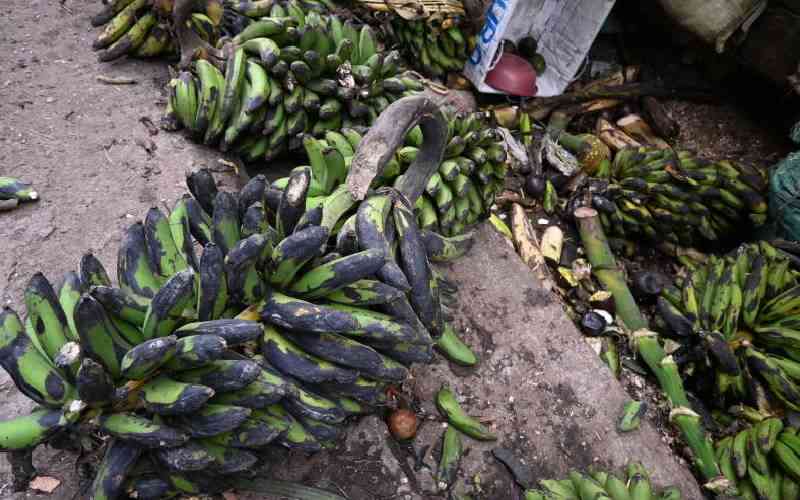Bananas going to waste in Muthurwa market, Nairobi, on March 21, 2021. [File, Standard]
The centrality of food in our lives is undeniable. Food brings people together, promotes culture, good health and keeps humanity alive. The world will mark World Food Day on October 16. The theme for this year is ‘Hand in hand for better foods and a better future’. Sustainable agriculture is key to ensuring food security through food production while promoting biodiversity, soil health, and the conservation of natural resources.
Sustainable Development Goal 2 aims to end hunger, achieve food security, improve nutrition and promote sustainable agriculture. This goal may be unachievable by 2030. In 2024, about 307 million people in Africa faced hunger. It is projected that 512 million people could be chronically undernourished by 2030. Almost 60 per cent of these people will be in Africa.
This year’s World Food Day will be marked amid challenges such as climate change which has increased the frequency of extreme weather events, ranging from flooding to droughts and high temperatures. Climate outlook for the October to December 2025 short rains already indicates that parts of Kenya will receive below average rainfall.
Follow The Standard
channel
on WhatsApp
Food-related challenges include lack of food, and poor-quality food. Adverse climate changes are leading to reduced food production, and contributing to increased hunger. Pollution is compromising the quality of food and reducing the quantity of food being produced due to the presence of toxins in the soil and water bodies. Insecurity makes it difficult to produce food as it interferes with the day-to-day activities of communities. Lack of food weakens education outcomes because hungry children cannot to go to school. The abandonment of traditional foods, which are resilient to adverse climate patterns, has led to reduced harvests.
Food preservation practices are compromising the quality of food. Food loss and wastage happens from harvest to household, during storage, transportation and processing, contributing to food insecurity.
Food loss and wastage are absurd in a world where people are dying from hunger. It is unacceptable that one-third of all produced food is thrown away annually. It is estimated that globally, US$1 trillion worth of food is wasted each year. Food loss and wastage is responsible for an estimated 8–10 per cent of greenhouse gas emissions, adversely affecting the environment.
Food loss and wastage means throwing away the precious resources, time and efforts that go into producing it. These includes the use of land and natural resources, the social cost to the environment, and biodiversity. Preventing food loss and wastage is critical for increasing food security because it will increase the availability of food for those who need it. Reducing food loss and waste is a climate solution.
Reducing food loss and wastage calls for joint efforts across sectors and for producers, businesses, supply chains, consumers, governments and researchers to take urgent action. It is everyone’s responsibility. The government should incentivise food supply chain stakeholders and businesses to scale up and expand their efforts to reduce food loss and waste, and implement circular economy practices.
Food producers should also be educated more on food handling practices to prevent loss. These efforts should lead to sustainable food systems in which varieties of sufficient, nutritious and safe foods are available and affordable by everyone, everywhere.
Ms Muathe is a communications specialist
Follow The Standard
channel
on WhatsApp
By Angela Muathe
